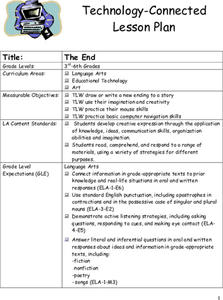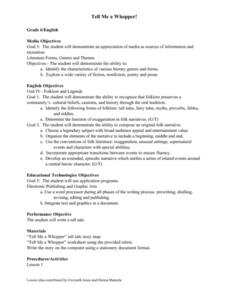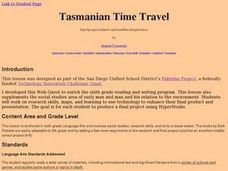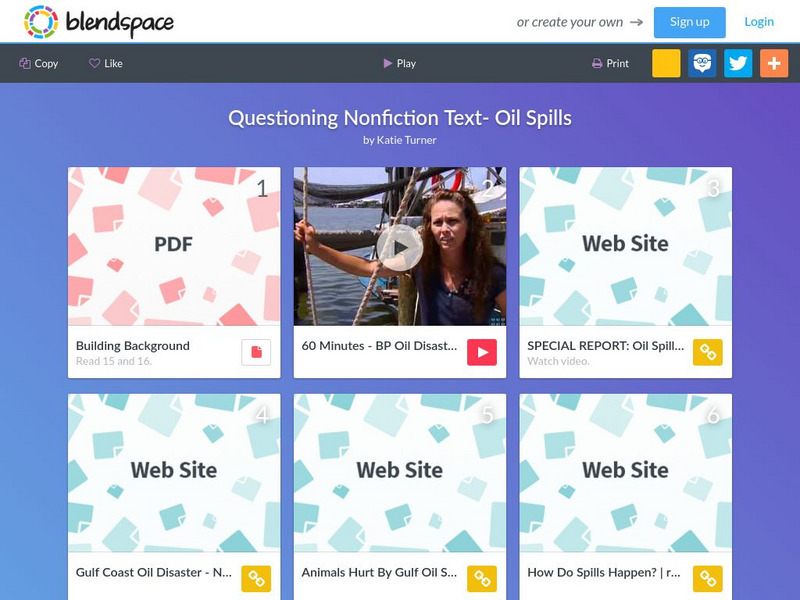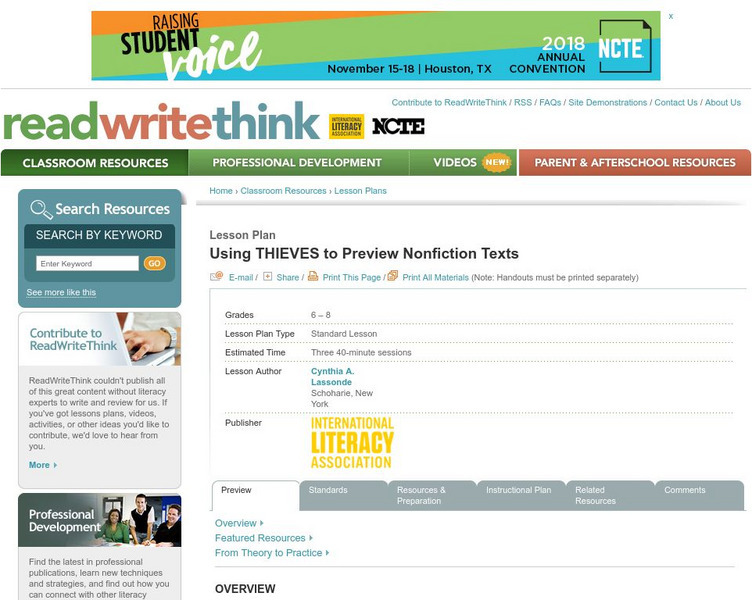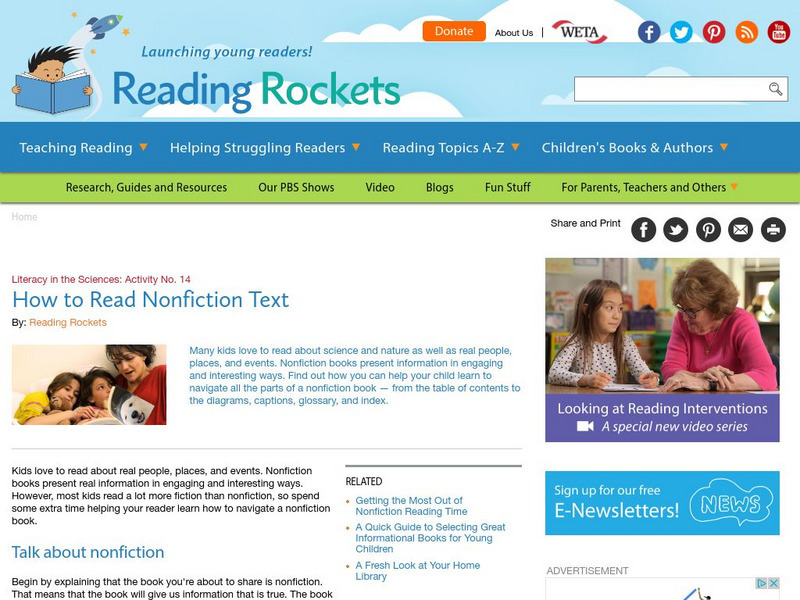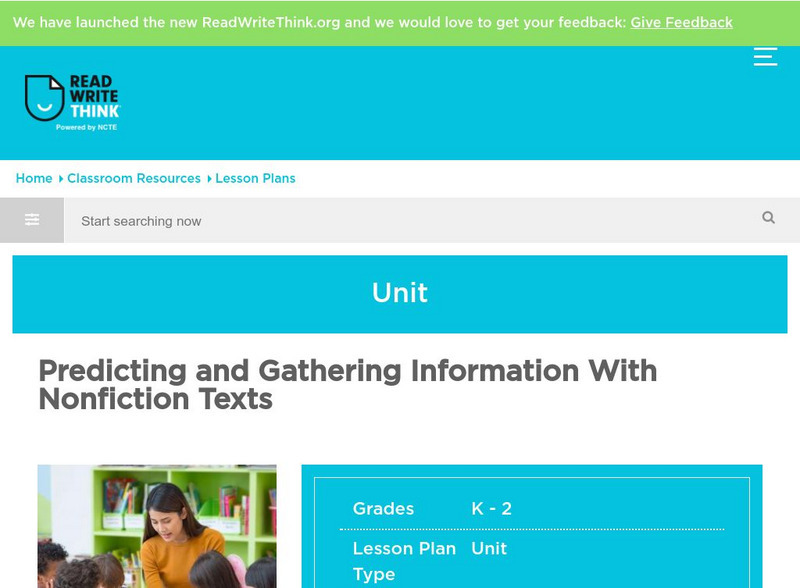Curated OER
Destination Reading
Students practice reading skills and comprehension through the use of computers and the educational software "Destination Reading" provided by Riverdeep in this self-directed lesson.
Curated OER
The End
Students listen as the teacher reads a story. Pictures are displayed as the teacher reads the story. Students jot down ideas for the story ending, and create an illustration to compliment their story. Student story endings and...
Curated OER
Make Way for Ducklings
First graders use skills to collect, organize, and interpret data. They compare and contrast two stories, Make Way for Ducklings and Chibi: A True Story From Japan. Students create a duckling.
Curated OER
Tell Me a Whopper!
Sixth graders investigate tall tales as a literary genre. They listen to a number of tall tales to discover how exaggeration is used as a story element. They write and publish a tall tale using word processing software. They illustrate...
Curated OER
Tasmanian Time Travel
Sixth graders perform research using the Internet about the Tasmanian Devil. The project can be presented in a variety of ways. The use of computer software is important for students to know, specifically Hyperstudio.
National First Ladies' Library
Are We There Yet?
Pupils study the wide-reaching effects of the Cold War, even to its involvement in domestic road construction. They research the National Defense Highway System (Eisenhower Highways) for information about the creation of the program, the...
National First Ladies' Library
Fitness for Life
Students discuss their favorite activities and determine which activities are suitable for older people. In groups, students research the benefits of aerobic exercises and the equipment needed. Students share their information with the...
National First Ladies' Library
Rock the Vote! But When?
Middle schoolers research and examine about voting turnouts in the United States and around the world. They assess about various aspects of the so-called "youth vote," and have an opportunity to consider the meaning of the vote in a...
British Library
British Library: 19th Century Non Fiction Texts: Work & Welfare
This thematic collection will allow students to read and understand 19th-century non-fiction texts, and support them in identifying key features for a range of genres, audiences, and purposes. Each source is accompanied by original...
British Library
British Library: 19th Century Non Fiction Texts: Gender, Behaviour & Etiquette
This thematic collection will allow learners to read and understand 19th-century non-fiction texts, and support them in identifying key features for a range of genres, audiences, and purposes. Each source is accompanied by original...
British Library
British Library: 19th Century Non Fiction Texts: Education
This thematic collection will allow students to read and understand 19th-century non-fiction texts, and support them in identifying key features for a range of genres, audiences, and purposes. Each source is accompanied by original...
British Library
British Library: 19th Century Non Fiction Texts: Crime & Punishment
This thematic collection will allow students to read and understand 19th-century non-fiction texts, and support them in identifying key features for a range of genres, audiences, and purposes. Each source is accompanied by original...
TES Global
Blendspace: Questioning Nonfiction Text Oil Spills
An eight-part learning module with links to texts, videos, and websites to use while improving informational text skills through the topic of oil spills. The print materials have directed exercises for text analysis by students.
ReadWriteThink
Read Write Think: Using Thieves to Preview Nonfiction Texts
Contains plans for three lessons that introduce a nonfiction prereading strategy with the acronym THIEVES, which stands for Title, Headings, Introduction, Every first sentence, Visuals and vocabulary, End Questions, and Summary. In...
Polk Brothers Foundation Center for Urban Education at DePaul University
De Paul University: Center for Urban Education: How Does Writer Organize Nonfiction Text?[pdf]
This poster contains writing craft questions for students to ask when reading nonfiction. This graphic organizer is a copyrighted material that may be used for educational purposes.
ReadWriteThink
Read Write Think: Comprehending Nonfiction Text on the Web
Contains plans for three lessons designed to improve comprehension of nonfiction, especially nonfiction texts on the web. It focuses on identifying text features, locating specific information, and generalizing that information. In...
ReadWriteThink
Read Write Think: Reading/writing About Whales Using Fiction and Nonfiction Texts
Students will have a whale of a good time in this lesson in which they use fiction and nonfiction texts to write a letter to an online scientist.
Reading Rockets
Reading Rockets: How to Read Nonfiction Text
Kids love to read about real people, places, and events. Nonfiction books present real information in engaging and interesting ways. However, most kids read a lot more fiction than nonfiction, so spend some extra time helping your reader...
Austin Independent School District
Austin Independent School District: Summary of Fiction and Nonfiction Text [Pdf]
This 31-page document focuses on teaching summarizing strategies for use with fiction and nonfiction texts. This series of lesson plans starts with fiction summarizing strategies such as "Somebody-Wanted-But-So-Then" and "Story Arch."...
ReadWriteThink
Read Write Think: Predicting and Gathering Information With Nonfiction Texts
Contains plans for eight short lessons that introduce nonfiction texts to second grade students. In addition to objectives and standards, this instructional plan contains links to sites used in the lessons as well as assessment and...
ReadWriteThink
Read Write Think: Animal Study From Fiction to Facts
Contains plans for five 50-minute lessons that ask students to compare and research information about animals from fiction and nonfiction texts. In addition to student objectives and standards, these instructional plans contains links to...
Polk Brothers Foundation Center for Urban Education at DePaul University
De Paul University: Center for Urban Education: Nonfict Readers Analyze Structure/views[pdf]
This graphic organizer contains questions for students as they analyze any nonfiction text. Students will read closely to determine the text's structure, viewpoint, and tone. This graphic organizer is a copyrighted material that may be...
E Reading Worksheets
E Reading Worksheets: Nonfiction Passages and Functional Texts Worksheets
In this learning module, students will practice reading nonfiction passages. Students will also have the opportunity to answer multiple choice comprehension questions, answer short and extended response questions, and take a test. This...
Quizlet
Quizlet: Non Fiction Text Features 3rd Grade Test
Text feature terms are included in this assessment. This test assesses the following text feature terms: map, table of contents, index, bold words, caption, timeline, heading, and glossary. Images of the text feature terms are included....
Other popular searches
- Nonfiction Text Features
- Nonfiction Text Structures
- Types of Nonfiction Text
- Features of Nonfiction Text
- Fiction and Nonfiction Text
- Nonfiction Text Elements
- Infer Nonfiction Text
- Parts of Nonfiction Text
- Summarizing Nonfiction Texts
- 6 Nonfiction Text Structure
- Inquiry and Nonfiction Text
- Reading Nonfiction Text



